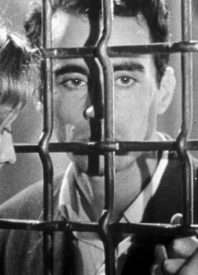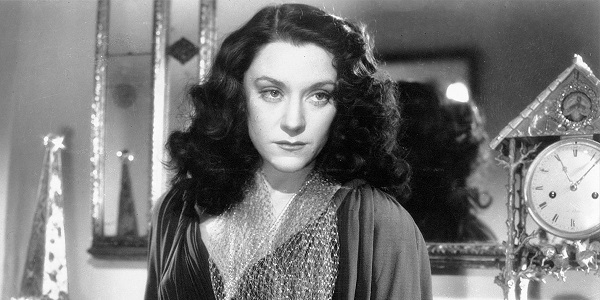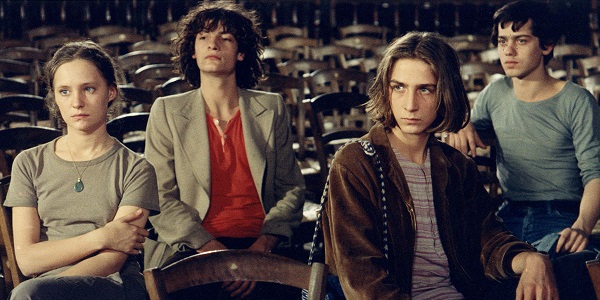
I first encountered Robert Bresson’s work, strangely enough, through a website where a woman took on the name Mouchette. She named herself after the movie with the same name. Here, the titular young girl (Nadine Nortier) has to care for her mother and faces a life altering decision. I discovered the site around 2001, when I was 13. At 18, Nortier could pass as younger. This youthful vulnerability makes her an inadvertent poster child for troubled teens. And the website, controversial as it is, became a place that framed her decision through both morbid and compassionate lenses.
And Bresson’s compassionate streak is present within the movies themselves. A Man Escaped was my first real encounter with him. Adapting Andre Devigny’s memoir, Bresson uses his experience as a French resistance fighter and prisoner of war in this movie. He fictionalizes those experiences through Lieutenant Fontaine (Francois Letterier). He shows him comforting inmates he can’t see while getting tips from them on how dangerous his escape is. In depicting Fontaine’s preparation and journey to freedom, Bresson prioritizes process over mood. He makes the villains unmemorable if not invisible, human serving as models instead of actors. And somehow, he gets us to understand Fontaine’s risky plans and root for him to get out.
Bresson made his audiences sympathize with people who find themselves within literal or metaphorical prisons. Sometimes, like in A Man Escaped, it feels easy and at others, like in Pickpocket, not so much. It’s about the titular thief, Michel (Martin La Salle). He divvies up his earnings with a mentor (Kassagi), while working with the police. He tries to make it look like he and, to a certain extent, his buddy looks clean. Bresson pays attention to every face and hand, closing up on them as well as Michel’s reaction to them. There’s a slight translucence here but that works competently to express the paranoia that comes with moral ambiguity.
Bresson didn’t only portray the downtrodden. There is the odd entry in his filmography that depicts the class structures within his generation. The characters in Ladies in the Park belong to the bourgeoisie. The protagonist Helene (Maria Casares) has enough money to support herself. She’s also bankrolling the life of a woman, Agnes (Elina Labourdette), she’s trying to ruin. A minimalist director, this is probably his most inherently maximalist film. That’s a quality that hinders this second feature from being good. But there are traces of his style here. He does his best to take away the glamour from these characters and spaces. He also makes some line deliveries more straightforward.
Nonetheless, there’s empathy and effortless tension in Bresson’s films even when he reveals his characters’ fates. He starts The Devil Probably with headlines reporting the death of his protagonist. That’s Charles (Antoine Monnier), who dies possibly through murder or suicide. He’s a fashionable young man, so murder is a possibility. But it eventually reveals his work as an activist and the futility therein. I then leaned towards suicide, an understandable quagmire for Bresson’s mostly young male protagonists. Looking at his films in a linear fashion also shows a depressing trajectory. His generation fought an evil only for the next one to be defenseless against other evils.
I saw The Devil Probably with an introduction by Brad Deane, who pointed out Bresson’s methods. One of those was seeing amateur models over actors. As I wrote above, he used that method exquisitely in A Man Escaped. Deane also pointed out Bresson’s use of sound, which sticks out in all of his films. He captures the loneliness in Francois’ whispers in A Man Escaped. Michel’s footsteps in Pickpocket, its volume depending on his arrogance or sense of guilt. The scores in all of his films marking his characters’ fleeting happiness. Or that gunshot in The Devil Probably, shocking us even if we know these characters’ fates.
While Bresson’s contemporaries glamorized the distant past, he chose to chronicle recent history. In a career that spanned 40 years, his 14 movies has tackled so many issues, war, addiction, class, and alienation. Directors can’t make films forever, and we’ve learned not to make white men of previous generations as our heroes. But his films are so relevant today. I would have loved to see what he would have said about our struggles. Even if they’re mutations of his. With TIFF’s retrospective, we can discover his insights. Tomorrow night, they’re screening Diary of a Country Priest. I hope to see some of you there.



